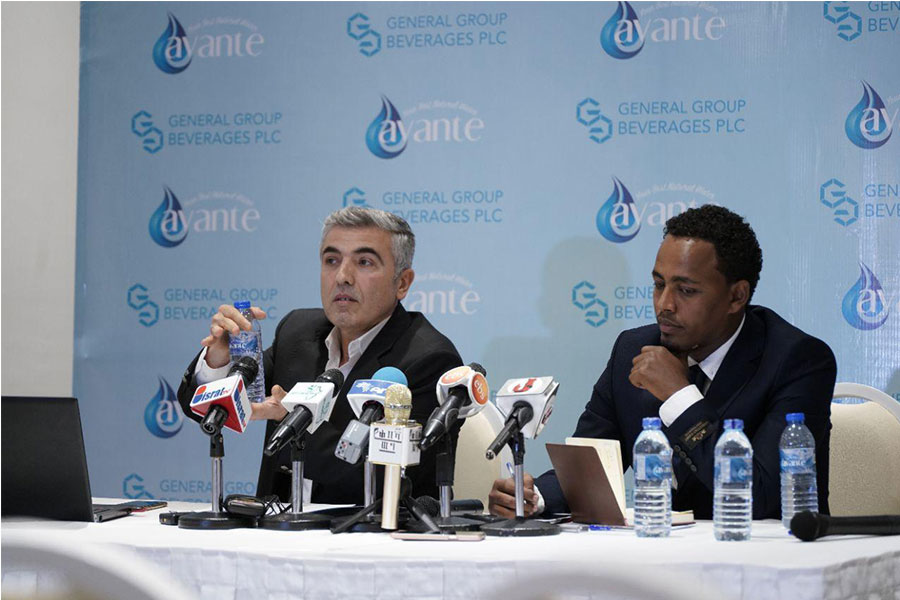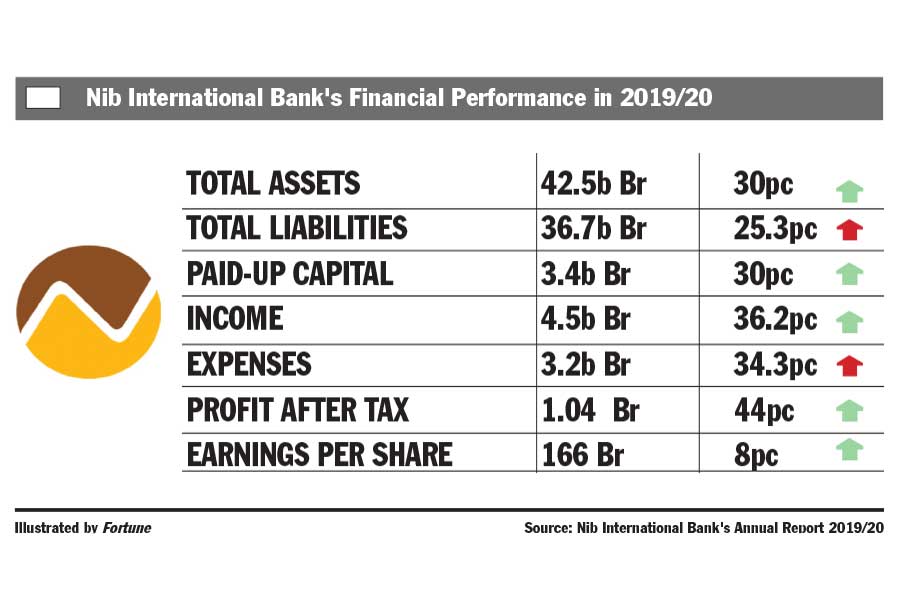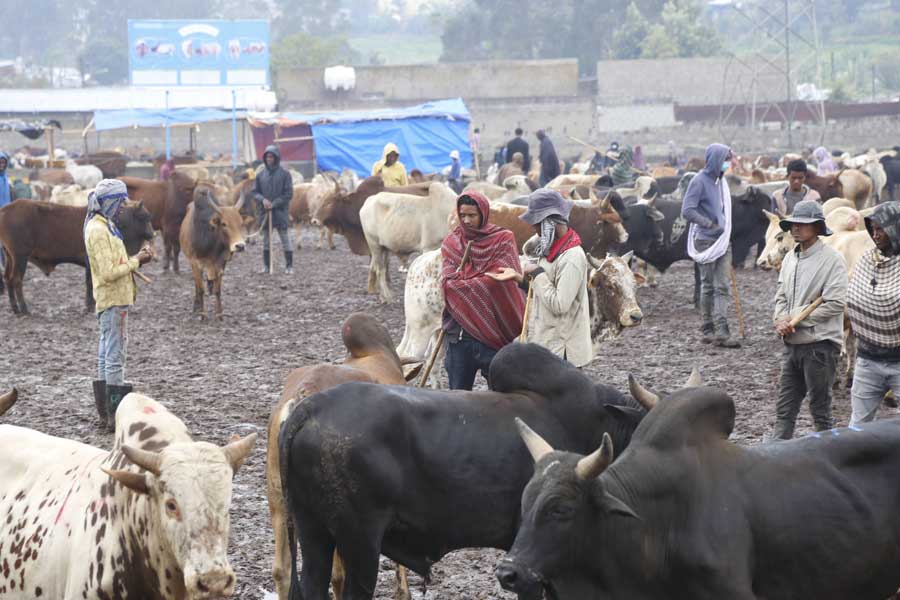
In Ethiopia's nascent and somewhat turbulent Islamic banking industry, a narrative of daring ambition, loss and potential resilience unfolds.
ZamZam Bank, Ethiopia's first full-service Islamic bank, recently declared an annual loss of 146.42 million Br in its fiscal year ending June 2022, a development that contrasts sharply with the firm's aggressive expansion plans. The news, however, has not dented the upbeat outlook of the Bank's executives, who highlight the positive strides made in their launch year.
Experts say given its considerable paid-up capital, a large pool of depositors, and a sizeable CAR, ZamZam Bank appears to be in a strong position to weather the initial turbulence. Indeed, the Bank's performance during its inaugural year does not detract from its substantial potential to grow in the nascent Ethiopian Islamic banking industry. Its competitive positioning and alignment with global Islamic banking trends position it favourably for the long haul.
Melika Bedri, the inaugural President of the Bank, contended that such losses were a common hazard for industry pioneers, particularly within the banking sector, where initial capital outlays can be steep. An economics graduate from Addis Ababa University and postgraduate in business administration from the Open University in London, Melika honed her skills in various roles at the state-owned Commercial Bank of Ethiopia (CBE), eventually serving as chief financial officer (CFO).
"High expense is expected in the first year of operation," she told Fortune.
The first-year financial performance of ZamZam was characterised by revenues of 6.5 million Br and towering operational costs of 187 million Br, with overhead expenses accounting for two million Birr. This narrative of initial struggle is not unique to ZamZam Bank; it is a trend common to Ethiopia's emergent Islamic banking sector, as mirrored by the loss reported by Hijira Bank, another nascent Islamic banking institution.
ZamZam's considerable financial loss can be attributed mainly to its bold move to scale its physical footprint quickly. In a departure from traditional banking norms for a start-up, the Bank established 40 branches across Addis Abeba and other urban areas, accounting for a significant 30pc of its total expenses. Melika has underscored the urgency to set up physical branches to cater to the pent-up demand for Islamic banking services.
With a population of over 114 million, of which a considerable proportion practises the Islamic faith, Ethiopia is an untapped territory for the Islamic banking industry, teeming with vast growth prospects. The success of Malaysia's Islamic banking industry, representing about 30pc of the country's total banking sector, paints a picture of the potential market size awaiting Ethiopia’s Islamic banks, including ZamZam.
Nasir Dino (PhD), chairman of ZamZam Bank, who has been advocating the inclusion of interest-free banking in Ethiopia for the past 14 years, first presented the idea to then Prime Minister Meles Zenawi and Abay Tsehaye, the then chairman of the state-owned Commercial Bank of Ethiopia (CBE). Nasir fondly recollects the ensuing policy debates that considered three different models for Islamic banking services: operation as a conventional bank with an interest-free window, establishment as a full-fledged interest-free bank, and transitioning from the former to the latter.
"It gave us hope to start promoting the idea," he said.
Despite managing to raise 330 million Br in subscribed capital, the promoters were unsuccessful in obtaining a license for a full-fledged Sharia-compliant bank from the National Bank of Ethiopia (NBE), confining such ideas to a window service within traditional banking operations.
However, the tide turned when Abiy Ahmed (PhD) ascended to the position of Prime Minister, paving the way for full-fledged Sharia-compliant banking. ZamZam Bank took the lead and launched in 2021, raising 872 million Br in paid-up capital and 1.68 billion Br in subscribed capital. This move was closely followed by Hijira, Shebelle, and Rammis banks, which joined the industry as full-fledged Islamic banks.
Nasir, who completed his postgraduate studies in Islamic banking at the London Institute of Islamic Banking & Insurance, believes the ZamZam Bank continues to have a robust market despite intensifying competition. In a shareholders meeting in December 2022, he reassured the stakeholders of long-term success and relevance, hinging on their trust and support as the Bank continues to refine its personnel, systems, and processes for better outcomes in the upcoming years.
Nadim Abdulsemed is a founding shareholder with 40 million Br invested in the Bank. Although he is yet to see dividends, Nadim is hopeful about the future.
"It'll get better after the Bank breaks even," he told Fortune.
Despite its initial financial setback, ZamZam's entry into the market reflects a broader global trend in the Islamic banking sector. It is not unusual for new entrants in this industry to experience losses during the initial years due to the high costs associated with launching Sharia-compliant financial products and services, establishing a customer base, and setting up an extensive branch network.
According to Allied Market Research, despite such setbacks, the global Islamic banking sector continues to flourish, with assets in the industry reaching 2.5 trillion dollars in 2019 and an expected compound annual growth rate (CAGR) of 5.5pc, projected to touch 3.8 trillion dollars next year. ZamZam's strategic orientation aligns with this global trajectory, indicating its intent to carve a niche in the fast-growing Islamic finance market.
However, the operational losses incurred by the Bank underline the high barriers to entry in this niche sector, particularly the complexities around developing Sharia-compliant products and establishing a trusted brand. Abdulmenan Mohammed, a London-based financial statement analyst, and a keen observer of Ethiopia`s financial sector, says ZamZam Bank, along with its peers, needs to focus on improving operational efficiency and cutting down on expenses. This could potentially involve reconsidering its aggressive branch expansion strategy and exploring digital banking solutions, aligning with the broader global trend of digitisation in banking, according to Abdulmenan.
Despite its rocky start, the financial trajectory of ZamZam Bank has not been altogether disappointing for its sharholders and executives.
There is a silver lining to the financial turbulence in which the Bank finds itself. Notwithstanding the apprehensions this may provoke among its 12,700 shareholders, long-term indicators present a positive picture of potential growth for ZamZam Bank. The Bank's paid-up capital has soared to 1.34 billion Br, a clear indicator of resilience amid losses, while it has successfully managed to mobilise 1.59 billion Br in savings, underscoring its potential to draw in depositors.
ZamZam's interest-free financing to savings ratio stands at a promising 52.9pc, a figure that surpasses several conventional banks offering interest-free banking services.
"The ratio is promising for a newcomer," said Abdulmenan.
ZamZam's total assets stand at 3.16 billion Br, against a total liability of 1.9 billion Br, showcasing a healthy balance sheet. The Bank also exhibits significant liquidity, with cash and bank balances accounting for 45.3pc of total assets and 73.4pc of total liabilities.
Muhama Mohammed, the manager at the Bole Atlas Amana Branch, attributed the ability to attract large businesses and serve corporate clients to the branch's strategic location, and called for more investment in aggressive promotion to maintain a positive brand image.
One of the more compelling aspects of ZamZam's growth strategy is its drive to invest in innovative Islamic banking products such as "Mudarabah," an Islamic contract regime in which one party provides the funds while the other offers expertise and management. ZamZam's disbursement of interest-free financing (including profit receivable on Murabaha) of 839.7 million Br, generating a return of 350 million Br, exemplifies the commitment to customer-centric innovation.
Another promising feature of ZamZam's financial position is its robust Capital Adequacy Ratio (CAR) at an impressive 144.5pc, far exceeding the minimum requirement, a testament to a strong capital base and low credit risk. According to Abdulmenan, given the sizable CAR, the Bank should utilise its capital more effectively by expanding its interest-free financing and other investment activities.
"We've designed a strategy that leverages our robust capital base," said Melika, highlighting the Bank's resolve to navigate through the initial hurdles.
The Bank's commitment to bolstering its operational foundation is visible in its substantial investment in core banking solutions, a vital infrastructure supporting all banking functions. This investment will likely be the bedrock for the Bank's future growth and efficiency.
In a quest to enhance its technological capabilities, the Bank has shown a proclivity towards self-reliance. It is planning to build its core banking system in-house and, in this pursuit, has established a strategic alliance with Hibret Bank, one of the first-generation private banks, for knowledge transfer.
PUBLISHED ON
Jun 24,2023 [ VOL
24 , NO
1208]

Fortune News | Jan 26,2019

Fortune News | Apr 08,2019

Viewpoints | May 10,2025

Radar | Dec 25,2023

Sponsored Contents | Mar 03,2022

Radar | Oct 17,2020

Fortune News | Jul 25,2020

Fortune News | Jan 23,2021

Radar | May 07,2022

Agenda | Apr 30,2021

Dec 22 , 2024 . By TIZITA SHEWAFERAW
Charged with transforming colossal state-owned enterprises into modern and competitiv...

Aug 18 , 2024 . By AKSAH ITALO
Although predictable Yonas Zerihun's job in the ride-hailing service is not immune to...

Jul 28 , 2024 . By TIZITA SHEWAFERAW
Unhabitual, perhaps too many, Samuel Gebreyohannes, 38, used to occasionally enjoy a couple of beers at breakfast. However, he recently swit...

Jul 13 , 2024 . By AKSAH ITALO
Investors who rely on tractors, trucks, and field vehicles for commuting, transporting commodities, and f...

Jun 28 , 2025
Meseret Damtie, the assertive auditor general, has never been shy about naming names...

Jun 21 , 2025
A well-worn adage says, “Budget is not destiny, but it is direction.” Examining t...

Jun 14 , 2025
Yet again, the Horn of Africa is bracing for trouble. A region already frayed by wars...

Jun 7 , 2025
Few promises shine brighter in Addis Abeba than the pledge of a roof for every family...